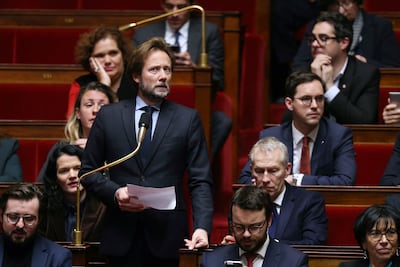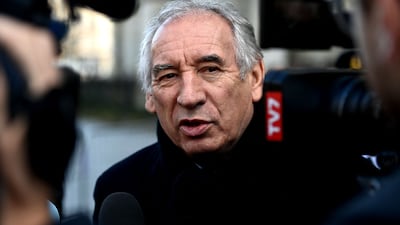French Prime Minister Francois Bayrou is expected to force through his government's budget without a parliamentary vote on Monday, raising the prospect of a no-confidence motion from the socialist party.
This will be the first time since his nomination in mid-December that Mr Bayrou will use a controversial parliamentary mechanism known as article 49.3, which allows him to push through laws without a parliamentary majority.
But it also comes with risks. His predecessor, Michel Barnier, had to step down after political parties made an alliance to topple his government after he tried to force through pension reform. The president of the socialist group at the National Assembly, Boris Vallaud, has said that a no-confidence motion "remains a possibility." Mr Bayrou is also set to invoke article 49.3 to force through the social security budget later in the week.
Government negotiators have focused on convincing the socialists not to join a no-confidence motion, which the leftist party France Unbowed has already that it will support. In December, the far-right National Rally (RN) allied with the left to topple Mr Barnier.
French politics has been engulfed in turmoil since a European election in June that nearly resulted in the far right taking over the government. There was no clear majority in Parliament after the ensuing snap election, which has weakened the position of President Emmanuel Macron and led to the resignation of two prime ministers.
The new no-confidence vote should take place on Wednesday. It will be closely scrutinised because new legislative elections cannot take place until at least one year after the previous election. The fall of Mr Bayrou's government would create an unprecedented crisis.

There is little patience left among the population for political theatrics, warned government spokeswoman Sophie Primas. "It's the responsibility of political parties to listen to the people," Ms Primas told the national broadcaster France 2.
In a last-ditch concession to the socialists, Labour and Health Minister Catherine Vautrin promised on Saturday to triple funds allocated to elderly people's housing projects, which are known by their French acronym, Ehpad. The government also made concessions to centrists and right-wing politicians with a pledge to fight health benefits fraud.
"The government's logic is the outstretched hand and not the ultimatum. But there comes a time when we will have to know when to stop. Our country needs a budget to move forward," Ms Vautrin told the daily Le Parisien.
Some socialist politicians appear to have welcomed the government's negotiations efforts and have said they will not back a no-confidence motion. While the text does not meet the group's expectations, socialist politician Jerome Guedj told Le Monde that he would call on his fellow politicians not to vote against it and welcomed the extra €6 billion allocated to the health sector since talks over the budget started last autumn.
Former socialist prime minister Lionel Jospin argued this weekend that the socialists should not back a no-confidence motion. "The administration would no longer be managed, and in the dramatic financial situation we are in, there would be neither a budget nor a law on financing Social Security," he said.
One RN deputy, Jean-Philippe Tanguy, told the broadcaster France 3 that the budget being proposed was "worse" than not having one, and said he personally wanted to back a motion of no confidence. But it will be for Marine Le Pen, who leads the RN faction in the National Assembly, and party leader Jordan Bardella to decide, he added.


